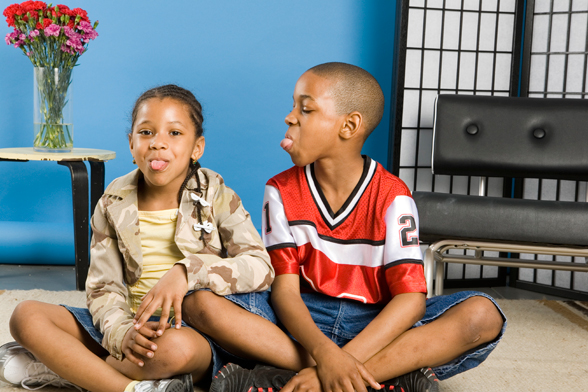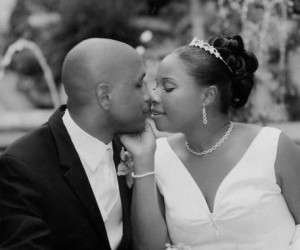 Many sisters could agree that their fantasy man would be something like a man with a body like LL Cool J and a smile like Tyrese. He’d be sexy like Idris Elba and talented like Jamie Foxx. He’d be articulate like Michael Eric Dyson and wise like Harry Belafonte. He’d have swagger, paper, and business smarts like Jay Z. He’d have a voice like Luther and keep you laughing like funny man Chris Rock. He’d be an innovator like Spike Lee. He’d have thug appeal like Allen Iverson and sensitive as Usher. He’d be smooth like TI and write you a rap song that pledges, “You can have whatever you like”. He’d be a powerful leader like our newly elected president Barack Obama. Yes, all of this wrapped into one would be a fantasy man. This man would have you smiling from the inside out. You’d sport him around your family and friends with great pride. Just thinking about a man likes this brings a smile to my face. Then as I allow the fantasy to disappear and I begin to take a look at reality I realize that I don’t desire a fantasy man. My wants and needs from a man don’t at all mirror the qualities of my fantasy man.
Many sisters could agree that their fantasy man would be something like a man with a body like LL Cool J and a smile like Tyrese. He’d be sexy like Idris Elba and talented like Jamie Foxx. He’d be articulate like Michael Eric Dyson and wise like Harry Belafonte. He’d have swagger, paper, and business smarts like Jay Z. He’d have a voice like Luther and keep you laughing like funny man Chris Rock. He’d be an innovator like Spike Lee. He’d have thug appeal like Allen Iverson and sensitive as Usher. He’d be smooth like TI and write you a rap song that pledges, “You can have whatever you like”. He’d be a powerful leader like our newly elected president Barack Obama. Yes, all of this wrapped into one would be a fantasy man. This man would have you smiling from the inside out. You’d sport him around your family and friends with great pride. Just thinking about a man likes this brings a smile to my face. Then as I allow the fantasy to disappear and I begin to take a look at reality I realize that I don’t desire a fantasy man. My wants and needs from a man don’t at all mirror the qualities of my fantasy man.
While many of us drool at the thought of the “fantasy man” described above, I believe that many of us want something a whole lot simpler. This man that we all want I will refer to as a Real Man. The real man is far more desirable than the fantasy man. The fantasy man is just that…. Fantasy. So let me speak truthfully and hope that these words reach the eyes of a man who has ever asked the question “What do women want?”. Perhaps this can even help that brother who is struggling with understanding what women mean when they say, “ I want a Real Man”.
First off, a real man doesn’t allow his fear of the truth to prevent him from being truthful. He speaks the truth even if he knows that speaking the truth will put him in hot water or make him uncomfortable. He is less concerned with the consequences of being truthful and more concerned with being a man of his word. His word is his bond. He realizes that he is a man and he has no reason to lie to anyone about anything. He values honesty. Therefore he gives it, expects it, and encourages it.
Second , a real man is wise and continuously seeks knowledge. He frowns upon not being educated. This doesn’t mean he is a Harvard graduate and it doesn’t mean he has a collection of degrees hanging on his wall. Instead, it means he has little tolerance for ignorance and would never find comfort in being ignorant. When he is unaware he goes to those who are wiser than he and seeks answers to the unknown. He isn’t afraid to say “ I don’t know” and he would never say, “I know everything”.
A real man is a natural leader. There is something about him that makes his woman want to follow his lead. He makes his own decisions and follows behind no one. His ability to lead allows him to be the head of his household without a saying a word. He doesn’t have to say, “I’m the man of this house”. His woman knows that he is the head of the household without ever hearing him speak. She humbly surrenders to his lead when he is a real man of leadership.
 A real man takes care of his babies. He will help raise them. He teaches them right from wrong and showers them with love. His babies look at him and smile. They crave his attention and affection. They call him Daddy and he is the most important man in their lives. His son will want to be like him. His daughter will want to fall in love with a man like him. He protects his babies at all costs. He tells his children that he loves them. A real man never disrespects his children’s mother even if he has little respect for her.
A real man takes care of his babies. He will help raise them. He teaches them right from wrong and showers them with love. His babies look at him and smile. They crave his attention and affection. They call him Daddy and he is the most important man in their lives. His son will want to be like him. His daughter will want to fall in love with a man like him. He protects his babies at all costs. He tells his children that he loves them. A real man never disrespects his children’s mother even if he has little respect for her.
A real man is sexy even with his clothes on. A woman’s attraction to him goes far beyond his physical appearance. He doesn’t work at being “sexy”. His sexiness is just natural. He can arouse a woman without ever touching her. His masculinity is what arouses his woman. His ability to take charge is what turns women on. Being a man of great strength, integrity, and wisdom is what makes him sexy as hell. His skills in the bedroom are just the icing on the cake (Holla!!!!!).
Finally, a real man is a man who prays and isn’t afraid to say that he prays. He believes in a higher a power. On his good days and his bad days he knows who reigns above all. This real man will introduce or reintroduce his woman to God. He will remind her where blessings come from. He may or may not go to church but he will definitely acknowledge his Creator.
So to all of my brothers out there who are in question about what women want, it’s quite simple. We want Real Men (not to be mistaken with men who say “I keep it real”.) Fantasy men are good if your eyes are closed and you’re fantasizing. However, in the real world, real women want real men who can really hold them down.
 For the last three years my child has been an only child, and will continue to be so for the foreseeable future. However, the idea of more children is not entirely out of the question.
For the last three years my child has been an only child, and will continue to be so for the foreseeable future. However, the idea of more children is not entirely out of the question.
















